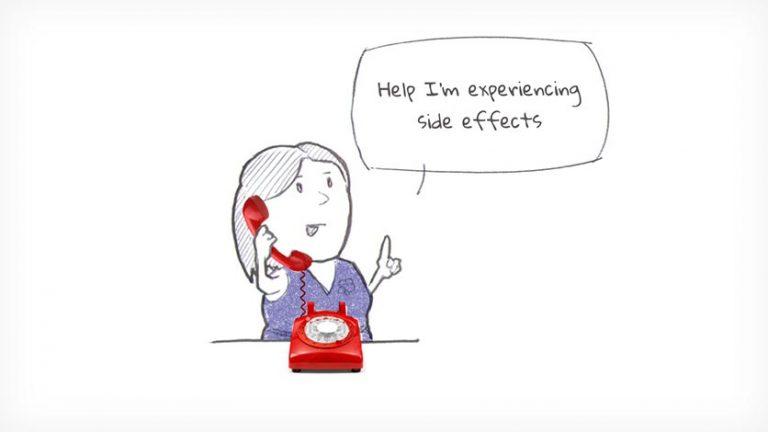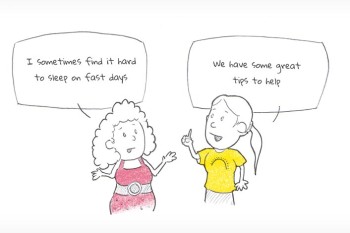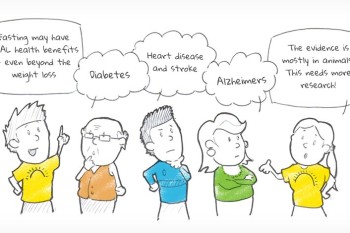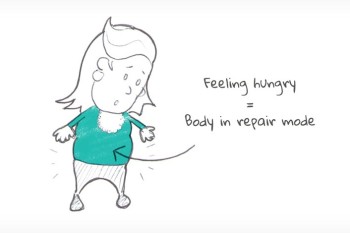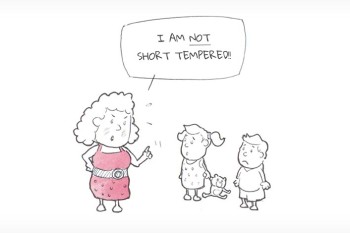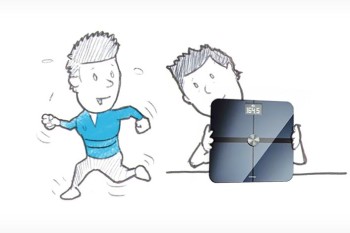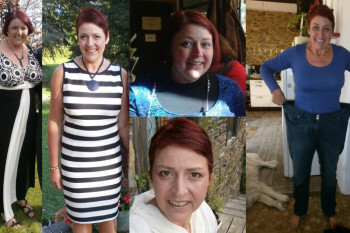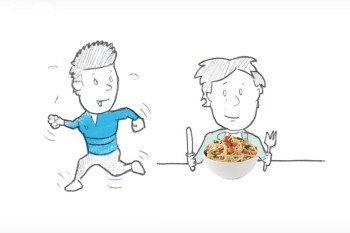Some of the problems that members of our FastDay community mention are due to weight loss rather than from fasting itself. For example:
-
Saggy skin if you lose a lot of weight.
-
Increased hair loss, particularly if you lose weight rapidly.
-
Change in menstrual cycle in women, which is likely due to changes in oestrogen levels associated with adipose tissue.
Flabby, loose skin
If you have a lot of weight you need to lose, unless you are still quite young, it is likely that your skin will take on a flabby appearance, seeming to be too big for your body. You may develop drooping skin over the abdomen forming an ‘apron’. Rapid weight loss (and 0.5kg per week is rapid even if it seems slow to you) often leads to this unsightly problem, which for people who have lost particularly large amounts of weight, can be rather depressing.
This loose skin is partly due to the skin not being able to shrink at the same speed as the reducing fat stores. It is also partly because the fat stored under the skin is not packed in as tightly as it was and becomes jelly-like in consistency with a higher water content. Finally, in severe obesity, the accumulating fat under the skin damages its structure so that when the fat is lost, the skin cannot return to its former size and elasticity. This occurs especially in the abdomen resulting in the ‘apron’ effect.
As we age, we our skin becomes less elastic in any case, and so losing weight in later life is more likely to result in loose skin.
There is good news though. Over time the loose skin will slowly decrease as your body decreases the amount of skin you have (as opposed to shrinking the existing skin), the water content will decrease and the fat stores become more firm. Although it is hard to predict how much the skin will shrink – skin elasticity varies from person to person and certain things can make worsen the skin’s stretchiness, such as exposure to sun, heat and cigarette smoking.
Regarding the tendency for the fat stored under the skin to be soft and flabby, firming up the muscles underneath through toning exercises can help its appearance. Skin is attached to your muscles by fibres that tighten up with increased muscular exercise, thus pulling skin in tighter to the muscle. Increased muscle mass will fill the space left by weight loss. Also as you lose more weight, some more of the fat stored under the skin will disappear and the flabbiness will decrease. So, further weight loss may not make the situation worse.
There are many products available which claim to help reduce loose skin, but as yet, none have lived up to their marketing claims. Good skin care, preventing skin from becoming dry, and use of creams to minimize development of skin problems in skin folds is certainly sensible.
In severe cases of excess skin, it is possible to have plastic surgery to remove the excess skin. Most surgeons will advise patients to wait for at least two years after reaching a stable weight to see how much the skin will shrink of its own accord.
If you are concerned about loose skin, there are various things you can try:
-
Working on toning your body through pilates or similar exercises
-
Moisturize your skin regularly
-
Support the loose skin by wearing close fitting underwear so as to prevent the weight of the skin from further stretching it and to provide a contouring effect
-
Some feel that cold water on the skin, or body brushing or other methods to improve the circulation in the skin can help to tone it up
-
Lose weight slowly to allow time for your body to adjust the fit of your skin to your changing size
-
If you are extremely unhappy with your loose skin, visit your doctor to discuss possible surgical options.
Hair loss
Rapid weight loss can be accompanied by an increase in how fast you shed hair. You might notice more hair on your hairbrush or accumulating in the shower plug hole and wonder if you are losing more hair than usual. Some of our forum members have had this happen.
When you lose weight rapidly it is because you are cutting your calorie intake by quite a large amount and this is likely to be accompanied by a cut in the amount of nutrients you are eating. There are several nutrients needed for healthy hair growth which may become deficient on a low calorie diet. With the fast diet (5:2 or 4:3) the days of normal eating should ensure you are not becoming deficient in nutrients, but if you find you are also eating a lot less on the non-fast days and you notice increased hair loss, you may need to make efforts to increase the amount of the following nutrients in your diet:
-
Biotin and other B vitamins (found in chocolate, dairy, eggs, fish and shellfish, nuts and seeds, whole grains and yeast)
-
Zinc (found in dairy, legumes/pulses, eggs, meats, nuts and seeds and whole grains)
-
Copper (found in fish and shellfish, dark leafy greens, nuts and seeds and whole grains)
-
Iron (found in eggs, fish and shellfish, legumes/pulses, liver, and meats).
Change in menstrual cycle
Losing weight reduces the size of your fat stores (adipose tissue). As oestrogen is stored and also manufactured in adipose tissue,1 changes in the amount of adipose tissue may cause a change in a woman’s menstrual cycle. Members of our FastDay forum have reported periods coming sooner than expected, break-through bleeding when taking the contraceptive pill, longer or heavier periods but also many members have noticed improvements in pre-menstrual symptoms, period pains and lighter, shorter periods.
Weight loss and fasting also affects levels of many other hormones, including the appetite hormone, leptin, which itself can affect menstrual cycles via its action in the part of the brain, the hypothalamus, that orchestrates the menstrual cycle. Thus many hormone changes occur with weight loss which can disrupt the menstrual cycle.
As you become used to fasting, things should settle down and overall your oestrogen levels will decrease.2 In fact, the oestrogen stored in your adipose tissue can increase your risk of breast and other hormone-related cancers, so losing weight will help reduce this risk by reducing the amount of stored oestrogen.
Studies examining the effects of fasting on reproductive hormones have found that despite some changes in the timing of hormone secretion there is no change in reproductive function3 so you need not worry that fasting will affect your ability to conceive. In fact, if you are overweight, losing weight will likely improve your ability to conceive.
If you suffer from polycystic ovary syndrome, fasting and weight loss may be beneficial through its effects on insulin resistance as well as reproductive hormone levels.

